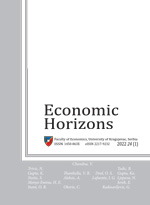EFFECTS OF INTERNATIONAL MONETARY INTEGRATION ON INFLATION, ECONOMIC GROWTH AND CURRENT ACCOUNT
Nenad Stanisic
Faculty of Economics University of Kragujevac
There are various benefi ts which countries could derive from the renouncement of a national currency hallmarked by unstable external and internal values. The most evident one is the reduction of a long-term infl ation rate. The objective of this paper is to test the hypothesis of the positive infl uence which monetary integration exerts on monetary stability and economic growth. On the other hand, monetary integration can also cause certain economic problems to countries’ economies, such as the one of the balance-of-payments adjustment. Hence this paper surveys its infl uence on the current account balance of national economies. The hypotheses are tested empirically by examining the sample of 42 countries from diff erent regions and of diff erent development levels. The results suggest that the monetary integration infl uences the infl ation reduction in developing countries, but not the achieved economic growth rates. At the same time, the results indicate that monetary integration contributes to an increase in the current account defi cit of developing countries, but not of developed ones.
Keywords: international monetary integration, economic growth, inflation, current account.
JEL Classification: F15, F31, F41, E31
Economic Horizons, 2012, Vol. 14, No. 1, pp. 3-13. doi: 10.5937/ekonhor1201003S
| Full Text |




